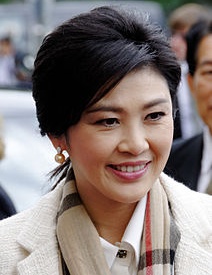Thai court orders PM Shinawatra to quit, but turmoil unlikely to end
07 May 2014
A court in Thailand today ordered that Prime Minister Yingluck Shinawatra must step down, after finding her guilty of abusing power, giving a victory to anti-government protesters who have staged six months of street protests.
 But the ruling by the Constitutional Court may only serve to prolong the country's political crisis, which has led to violent protests and brought the economy close to recession.
But the ruling by the Constitutional Court may only serve to prolong the country's political crisis, which has led to violent protests and brought the economy close to recession.
The decision is bound to anger supporters of Yingluck, but the court did allow ministers not implicated in the case against her to stay in office, a decision that could take some of the sting out of any backlash on the streets.
The court found Prime Minister Yingluck Shinawatra guilty of abusing her power by transferring a senior civil servant in 2011 to another position. It ruled that the transfer was carried out to benefit her politically-powerful family, and therefore violated the constitution - an accusation she has denied.
The ruling also forced out nine cabinet members, but left nearly two dozen others in their posts, including deputy prime minister Niwattumrong Boonsongpaisan, who was quickly appointed the new acting leader. Tthe cabinet said the caretaker government would press ahead with plans for a 20 July election.
"The caretaker government's responsibility now is to organise an election as soon as possible," said Niwatthamrong, a former executive in a company owned by Thaksin Shinawatra, Yingluck's brother and himself a former prime minister who was ousted by the military in 2006.
"I hope the political situation will not heat up after this," Niwatthamrong said of the court ruling.
Thailand's protracted political crisis broadly pits Bangkok's middle class and royalist establishment against mainly poor, rural supporters of Yingluck and Thaksin, who lives in exile to avoid a 2008 jail sentence for abuse of power.
Yingluck, who faced six months of sometimes deadly protests in the capital, Bangkok, aimed at toppling her government and ending the considerable political influence of her brother, thanked the Thai people in a televised news conference.
"Throughout my time as prime minister I have given my all to my work for the benefit of my countrymen ... I have never committed any unlawful acts as I have been accused of doing," Yingluck said, smiling and outwardly upbeat.
"From now on, no matter what situation I am in, I will walk on the path of democracy. I am sad that I will not be able to serve you after this."
Despite her removal from power, there is no obvious end in sight to the turmoil in Thailand, with protesters opposed to Yingluck and her government still pushing for political reforms before new elections.
Yingluck, a businesswoman until entering politics to lead her party to victory in a 2011 election, was not in court on Wednesday. Thaksin, based in Dubai, was unavailable for comment.
Financial markets took the ruling in their stride. The stock market had fallen as much as 1.1 per cent early on as investors worried about unrest if Yingluck's whole cabinet had been forced out, but the index ended down just 0.1 per cent. The baht was barely changed at 32.37 per dollar.
The army, which has staged numerous coups since the end of absolute monarchy in 1932, has stayed out of the turmoil, as has King Bhumibol Adulyadej. The king, who is 86, has intervened to defuse previous crises but has not commented since this one blew up late last year.
The divide between the poor and what they see as the establishment elite represents a collapse of a traditional order in Thailand at a time when people have begun to broach the hitherto taboo topic of succession. Crown Prince Vajiralongkorn does not command the same devotion as his father, the world's longest-reigning monarch.




















